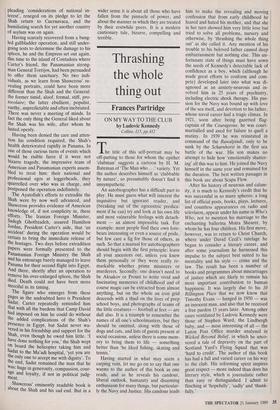Thrashing the whole thing out
Frances Partridge
ON MY WAY TO THE CLUB by Ludovic Kennedy Collins, £15, pp.432 The title of this self-portrait may be off-putting to those for whom the epithet 'clubman' suggests a cartoon by H. M. Bateman of 'The Man who ...' variety. Yet the author describes himself as 'clubbable by nature', so presumably doesn't find it unsympathetic.
An autobiographer has a difficult part to play. He must guess what will interest the inquisitive but ignorant reader, and (breaking out of the egocentric predica- ment if he can) try and look at his own life and most vulnerable feelings with detach- ment — an almost impossible task. For example: most people find their own fore- bears interesting or even a source of pride, but few care a fig for those of others, as such. So that a manual for autobiographers should begin with the first principle: leave all your ancestors out, unless you knew them personally or they were really re- markable whether prime ministers or murderers. Secondly: one doesn't need to be Aksakov or Proust to write vivid and fascinating memories of childhood and of course magic can be extracted from almost anything, but on the whole an iron grid descends with a thud on the lives of prep school boys, and photographs of teams of the little creatures — football at feet — are dull also. It is a triumph to remember the names of all one's schoolmasters, but they should be omitted, along with those of dogs and cats, and lists of guests present at social occasions, unless there is some mem- ory to bring them to life — something better than 'he liked fishing, skating and tennis.'
Having started in what may seem a carping vein, let me go on to say that one warms to the author of this book as one reads, and as he reveals his candour, liberal outlook, humanity and disarming enthusiasm for many things, but particular- ly the Navy and Justice. His candour leads him to make the revealing and moving confession that from early childhood he feared and hated his mother, and that she in her turn showed him very little love but tried to solve all problems, nursery and otherwise, by 'thrashing the whole thing out' as she called it. Any mention of his trouble to his beloved father caused deep embarrassment but nothing else. This un- fortunate state of things must have sown the seeds of Kennedy's detectable lack of confidence as a boy, which (although he made great efforts to conform and com- pete) developed later into what was di- agnosed as an anxiety-neurosis and in- volved him in 25 years of psychiatry, including electric shock therapy. His pas- sion for the Navy was bound up with love of the sea itself, and devotion to his father, whose naval career had a tragic climax. In 1921, soon after being gazetted flag- captain of the Courageous, he was court- martialled and axed for failure to quell a mutiny. In 1939 he was reinstated in command of the Rawalpindi, only to be sunk by the Scharnhorst in the first sea battle of the war. His son makes no attempt to hide how 'emotionally shatter- ing' all this was to him. He joined the Navy himself in the same year and remained for the duration. The best written passages in this book are about Scapa Flow.
After his history of neurosis and calam- ity, it is much to Kennedy's credit that he was successful in so many spheres; a long list of official posts, books, plays, lectures, and countless appearances on radio and television, appear under his name in Who's Who, not to mention his marriage to the enchanting ballerina Moira Shearer, by whom he has four children. His first move, however, was to return to Christ Church, where under David Cecil's tutelage he began to consider a literary career, and after some journalism he harnessed this impulse to the subject best suited to his mentality and his style — crime and the law. The result has been a number of books and programmes about miscarriages of justice which are likely to remain his most important contribution to human happiness. It was largely due to his 10 Rillington Place that we now know that Timothy Evans — hanged in 1950 — was an innocent man, and also that he received a free pardon 15 years later. Among other cases ventilated by Ludovic Kennedy were those of Stephen Ward, the Lindbergh baby, and — most interesting of all — the Luton Post Office murder analysed in Wicked Beyond Belief, in which he unco- vered a tale of depravity on the part of Scotland Yard's Flying Squad that was 'hard to credit'. The author of this book has had a full and varied career on his way to the club. His reforming spirit inspires great respect — more indeed than does his literary style, which is journalistic rather than easy or distinguished. I admit to flinching at 'hopefully', 'sadly' and 'thank- fully.'


























































 Previous page
Previous page